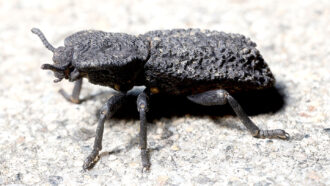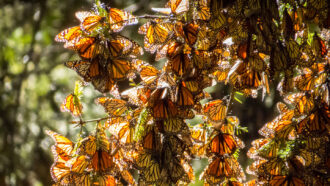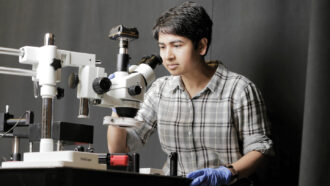All Stories
-
 Tech
TechAI can now turn blurry thermal vision into crisp images
Even when it’s pitch black, the new imaging system can create clear images while also accurately gauging distances to objects.
-
 Fossils
FossilsNew fossils bring the wide world of pterosaurs to life
The latest clues from fossils hint at where these flying reptiles came from, how they evolved, what they ate and more.
By Sid Perkins -
 Tech
TechMagic, cooking and droids inspire this roboticist
Dennis Hong and his team design human-like robots that can help solve problems and also entertain.
-
 Animals
AnimalsLet’s learn about beetles’ survival superpowers
Some beetle species can survive extreme pressure, dehydration or even getting eaten.
-
 Physics
PhysicsScientists Say: X-ray
X-rays are a type of light that doctors use to image the inside of the body. Astronomers use X-rays to explore the cosmos.
-
 Tech
TechNew glasses can ‘hear’ what you lip sync — and tell your phone
The lip-reading device enables voice commands without the voice. The glasses determine what their wearer is saying by tracking facial movements.
-
 Space
SpaceNew telescope images may unveil stars fueled by dark matter
Three objects from the early universe could be hypothesized “dark stars,” researchers claim. But other scientists remain unconvinced.
By Skyler Ware -
 Science & Society
Science & SocietyTop 10 tips for how Gen Z’ers can get the best online experiences
Emerging data point to how today’s teens can maximize their screen time’s benefits while limiting its risks.
-
 Animals
AnimalsAnalyze This: White wing spots may help monarch butterflies fly far
Monarchs with more white on their wings are more successful migrants, new research shows
-
 Tech
TechCould Star Trek replicators exist?
Experts break down what’s possible and what’s not for this classic science-fiction invention.
-
 Life
LifeScientists Say: Mycelium
These fibrous networks are the reason plants think fungi are such "fun guys.”
-
 Tech
TechNanobots can now enter brain cells to spy on what they’re doing
Fleets of advanced versions may one day be able to detect disease and then go about surgically treating it — without ever opening the skull.
By Nikk Ogasa